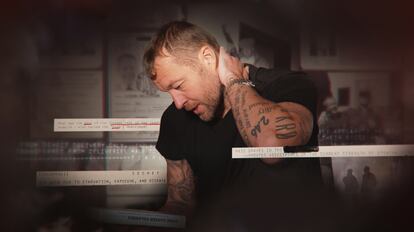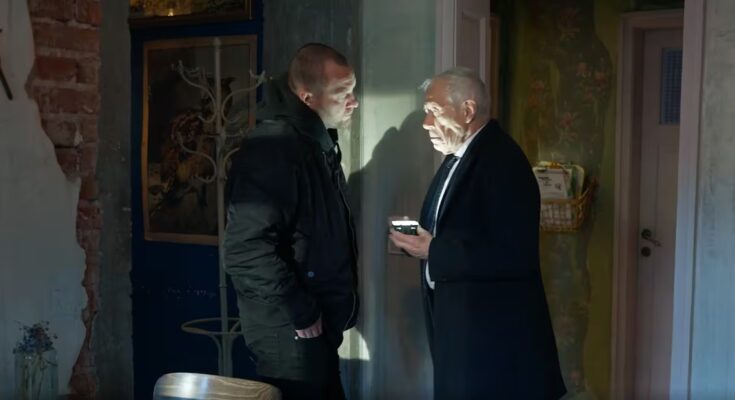There is a father, Bjørn Hallstrøm, and there is a son, Dimitri Hallstrøm. Among these, the memory of a moment in the family car – that moment which, like lightning, splits an existence in two – when the first confesses to the second, a twelve-year-old: “I am a spy”.
Three decades later, that son, who himself has just become a father, decides to find out if that flashing phrase, almost with a life of its own – “I’m a spy” – is true. It happens inside The Agent: My Father’s Life and Lies (translated as My Father’s Agent, Life and Lies; Magnus Skatvold and Oyvinn Haugerud Kastnes, 2025), awarded for best docuseries at Cannes, which triumphed at the Serializados festival and will still be visible on Filmin until November 23rd.
Dimitri takes taxis, trains, planes and travels across different parts of Norway and Europe to talk to people who worked with his father when he was a TV journalist. And everyone, in their own way, confesses something they already know: Bjørn is a very strange man.
Despite not having a smooth relationship, driven by a question that is pounding in his head, he decides to visit him in Sofia (Bulgaria), where Bjørn lives in retirement. The question that doesn’t let his son sleep is: is it possible that all those trips to Afghanistan, Cambodia, Nicaragua, Kosovo, Iraq to create information services and documentaries on the suffering and violence that conflicts generate in ordinary people, sold to the television networks of Norway, Denmark, Finland and Sweden, were in reality an espionage cover? It was possible that all that dedication and enthusiasm for his program Come closerthat revolutionary space that was successful in Scandinavia and which consisted of bringing a handful of teenagers to countries such as the harsher Cuba of the Special Period, to Colombia in the midst of the terrorist war against drug trafficking, or to Kuwait (curiously, the day after the departure of the Iraqis from the country, in 1991), so that young people “discovered other ways of living”, was it really doing it to carry out secret CIA missions?
Starting from Dimitri’s journey, the docuseries reveals a family labyrinth full of silence, wear and tear and a terrible secret that a Norwegian newspaper from 8 April 1950 headlined as Revolutiondrama. Along the way, the series follows the geopolitical thread of the Cold War – “a competition of nightmares”, in the words of the British historian Eric Hobsbawm –, the last years of the 20th century and the first decade of the 21st.
NATO and 007
Over the course of six episodes of 30 minutes each, in The Agent We discover the many layers of the life of a man who, before the age of twenty, dreamed of buying a Volvo, until he saw the film in the cinema. 007 against doctor n and he wanted a much better car and to travel more, much more. Lover of uniforms and weapons, he began by founding an advertising agency specializing in political propaganda, known for a campaign in favor of NATO. An apparently anonymous Norwegian citizen and, therefore, owner of one of the most coveted passports in the world in the 1980s and 1990s: under its veneer of a peaceful and social democratic country, that passport was a magic key that opened the doors of all the countries in the world and allowed entry into military barracks, offices and embassies, refugee camps or guerrilla training centers.

Drawing on rich and familiar videotaped material, The Agent It is also the chronicle of the revelation of the paternal figure in all its mystery because don’t a father and a mother have a sort of mythological figure for their children? It’s the story of an old TV presenter who manages to talk to his son only when he sees the camera light come on, and who at a certain point, absent-mindedly, tells him: “It’s nice to get to know each other a little before we die”.
And we glimpse the infinite faces of a gigantic swindler, now an elderly compulsive smoker of Rothmans cigarettes, of a snake charmer who claims to have taken a thousand planes in 25 years, of a husband who his wife Jane Hallstrøm – young and pretty in the first videotapes, with a very sad and exhausted face immediately afterwards – describes as a man with two personalities: that of a family member at home, and that of “king at home”. mission,” where he manipulated and controlled everything and everyone until he got what he wanted.
In this path of confession, the tough agent breaks down only by remembering his work in Sarajevo and Srebrenica in the nineties, and it is then that a revelation with witnesses sheds light on his dark figure: he once disguised himself as chief of staff to help two Bosnian teenagers escape from the war and obtain refugee status for them in Norway.
In The Agent We see the puzzle of Bjørn’s life unfold before Dimitri’s question-filled eyes. And he doesn’t like moral judgment. “Reprehensible, pure narcissism,” says one of the teenagers – now in his fifties – who attended one of his programs. Come closer. “A case of megalomania,” declares his ex-wife. “It’s pretty scary,” his son finally manages to say.
Bjørn worked for the CIA, but also for the Mossad and MI6. The truth is that the geopolitical picture of the last fifty years reveals a vast panorama of agents serving different intelligence networks. Anonymous people like Dimitri, but also famous people, explain it. Recently the actor Jackie Chan revealed that his father was a spy, and Julian Nagelsmann, coach of the German national team, and Stewart Copeland, drummer of the Police, also explained it.

